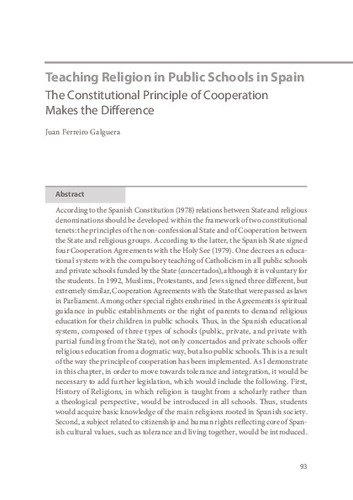Teaching Religion in Public Schools in Spain: the Constitutional Principle of Cooperation Makes the Difference
Autor(es) y otros:
Fecha de publicación:
Editorial:
Springer
Citación:
Descripción física:
Resumen:
According to the Spanish Constitution (1978) relations between State and religious denominations should be developed within the framework of two constitutional tenets: the principles of the non-confessional State and of Cooperation between the State and religious groups. According to the latter, the Spanish State signed four Cooperation Agreements with the Holy See (1979). One decrees an educational system with the compulsory teaching of Catholicism in all public schools and private schools funded by the State (concertados), although it is voluntary for the students. In 1992, Muslims,Protestants, and Jews signed three different, but extremely similar, Cooperation Agreements with the State that were passed as laws in Parliament. Among other special rights enshrined in the Agreements is spiritual guidance in public establishments or the right of parents to demand religious education for their children in public schools. Thus, in the Spanish educational system, composed of three types of schools (public, private, and private with partial funding from the State), not only concertados and private schools offer religious education from a dogmatic way, but also public schools. This is a result of the way the principle of cooperation has been implemented. As I demonstrate in this chapter, in order to move towards tolerance and integration, it would be necessary to add further legislation, which would include the following. First, History of Religions, in which religion is taught from a scholarly rather than a theological perspective, would be introduced in all schools. Thus, students would acquire basic knowledge of the main religions rooted in Spanish society. Second, a subject related to citizenship and human rights reflecting core of Spanish cultural values, such as tolerance and living together, would be introduced.
According to the Spanish Constitution (1978) relations between State and religious denominations should be developed within the framework of two constitutional tenets: the principles of the non-confessional State and of Cooperation between the State and religious groups. According to the latter, the Spanish State signed four Cooperation Agreements with the Holy See (1979). One decrees an educational system with the compulsory teaching of Catholicism in all public schools and private schools funded by the State (concertados), although it is voluntary for the students. In 1992, Muslims,Protestants, and Jews signed three different, but extremely similar, Cooperation Agreements with the State that were passed as laws in Parliament. Among other special rights enshrined in the Agreements is spiritual guidance in public establishments or the right of parents to demand religious education for their children in public schools. Thus, in the Spanish educational system, composed of three types of schools (public, private, and private with partial funding from the State), not only concertados and private schools offer religious education from a dogmatic way, but also public schools. This is a result of the way the principle of cooperation has been implemented. As I demonstrate in this chapter, in order to move towards tolerance and integration, it would be necessary to add further legislation, which would include the following. First, History of Religions, in which religion is taught from a scholarly rather than a theological perspective, would be introduced in all schools. Thus, students would acquire basic knowledge of the main religions rooted in Spanish society. Second, a subject related to citizenship and human rights reflecting core of Spanish cultural values, such as tolerance and living together, would be introduced.
ISBN:
Colecciones
Ficheros en el ítem




